Coverage: UN Women Executive Director in Bangladesh
Date:
Author: Montira Narkvichien
UN Women Executive Director Phumzile Mlambo-Ngcuka undertook her first official visit to Bangladesh from 30 January to 3 February. During her visit, the Executive Director met with key government and civil society partners as well as international development actors both in Dhaka and in Cox's Bazar, where the Rohingya Refugee response is taking place.
3 February 2018
UN Women Executive Director Phumzile Mlambo-Ngcuka met with development partners and engaged in a dialogue that focused on strengthening government accountability for implementation of the numerous laws and policies that have been adopted in Bangladesh to promote women's rights and gender equality.
The Executive Director and Ambassadors, High Commissioners and Heads of development agencies present at the meeting also discussed the importance of addressing gender-discriminatory attitudes and norms that are at the root of violence against women and impunity of violence in Bangladesh by calling on everyone in society, including men and boys, to take decisive action. The Executive Director said that UN Women's HeForShe initiative had the potential to change norms. "Men everywhere need to take an active role, by listening to women's experiences, speaking up when abuse occurs and holding other men - and themselves - accountable for their words and actions." She also stressed that the media are potentially powerful channels of information.
Later the Executive Director addressed the local media. She praised the Government of Bangladesh as well as its people for their generosity in welcoming the Rohingya despite the country's own development challenges. She also highlighted the efforts of the government to address needs of women and girls and protection of their rights and dignity during this humanitarian crisis, the worst one in the world at present. She spoke of the importance of providing income-generating opportunities and supporting transferable skills development for the refugee women. She added that the Government has reassured UN Women that the repatriation of Rohingya will be voluntary, safe and dignified.
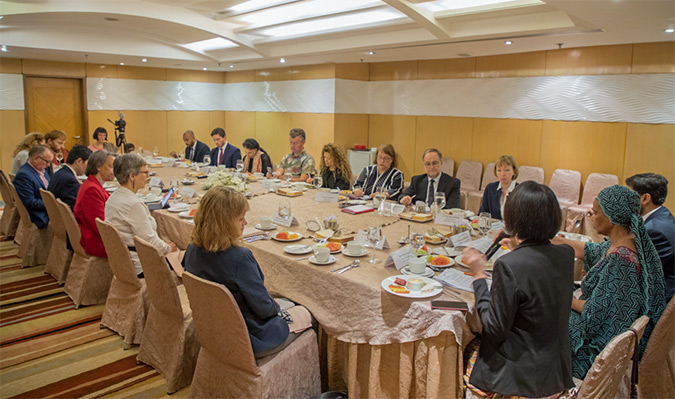
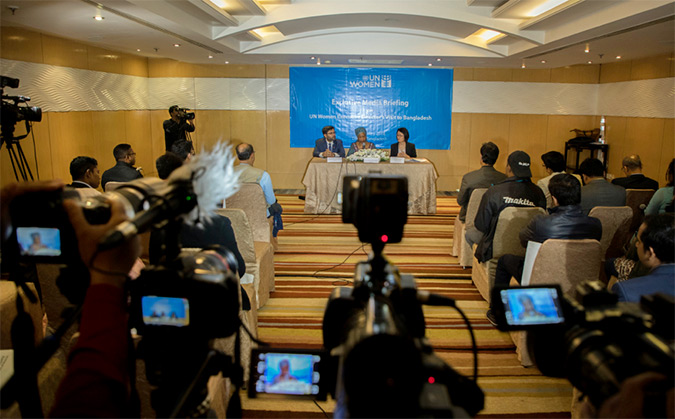
2 February 2018
UN Women Executive Director Phumzile Mlambo-Ngcuka met with Meher Afroze Chumki, State Minister for Women and Children Affairs of Bangladesh today. The State Minister shared the many achievements of the country on gender equality, including measures that have enabled women's participation in every sector of the society, from judges, doctors and police officers to fighter jet pilots. The Executive Director thanked the Minister for her active contribution to normative processes such as the reporting to the Committee on the Elimination of Discrimination against Women (CEDAW) and participation in the UN Commission on the Status of Women (CSW).
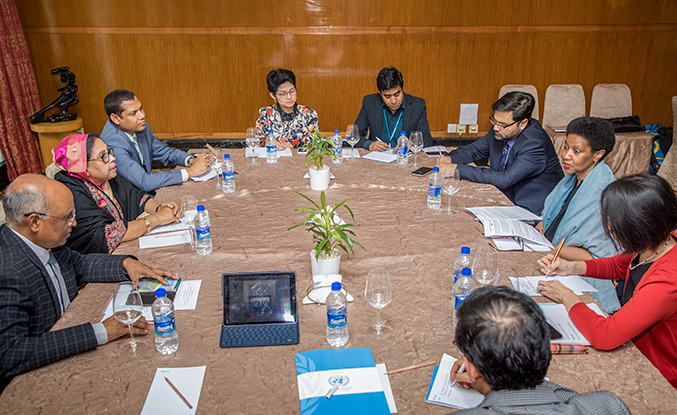
The Executive Director shared that the upcoming session of the Commission on the Status of Women focuses on rural women, and encouraged the Minister to include women representatives from rural Bangladesh in her delegation to showcase stories of success from Bangladesh's many initiatives to empower rural women. The Executive Director also requested the Minister to keep Bangladesh at the forefront of implementing the Sustainable Development Goals (SDGs) by eliminating discrimination in laws, as well as continuing the downward trend in child marriage by ensuring that the Child Marriage Act adopted in 2017 will have strict implementing rules.
Next, the Executive Director met the United Nations (UN) Resident Coordinator Mia Seppo and UN Heads of agencies in Bangladesh, with whom she shared her observations on priorities for gender equality in Bangladesh. She stressed that globally and in Bangladesh, tackling the underlying social norms, attitudes and practices that undermine laws and policies already in place is critical.
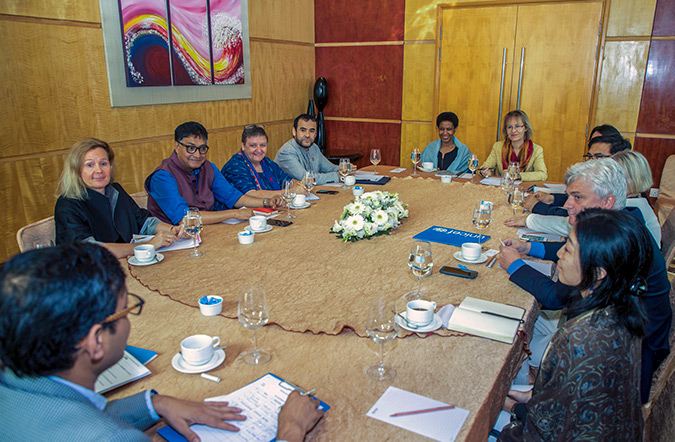
In the meeting with civil society organizations, the Executive Director congratulated leaders for their contribution to the formulation of key national policies such as the National Women's Advancement Policy (2011) and the Domestic Violence Act (2010), and for their efforts to advance women's economic rights and political participation. Bangladeshi civil society leaders, such as Ayesha Khanam, Khushi Kabir, Farah Kabir, Shaheen Anam, Sheepa Hafiza and Salma Ali, reflected on the key barriers to achieving gender equality, including deep-rooted patriarchal attitudes and norms, and the use of religion to hinder women's equal participation.
Economic empowerment of women and their skills development remain top priorities for Bangladesh, as reflected by the Prime Minister in her meeting with the Executive Director earlier during this visit. During her meeting with civil society and women leaders, Mlambo-Ngcuka stressed the need to ensure women's access to resources and to the formal employment sector, as well as the importance of equal participation of women in decision-making, including for peace and security.
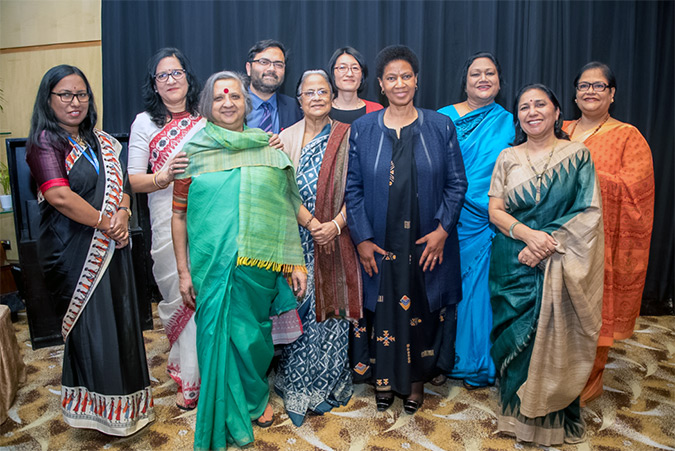
As the evening concluded, the Executive Director was the guest of honour at the theatre performance of "It's a SHE Thing" by the Bonhishkha group, portraying real-life stories of today's women in Dhaka. The Executive Director wrapped up the discussion session following the performance by saying, "the beauty about art is that it can tell you the difficult truth and bring you to its story and force you to tell the truth in an effortless way."
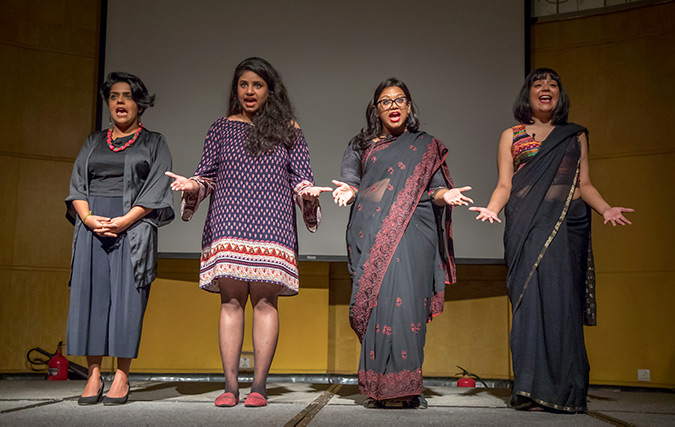
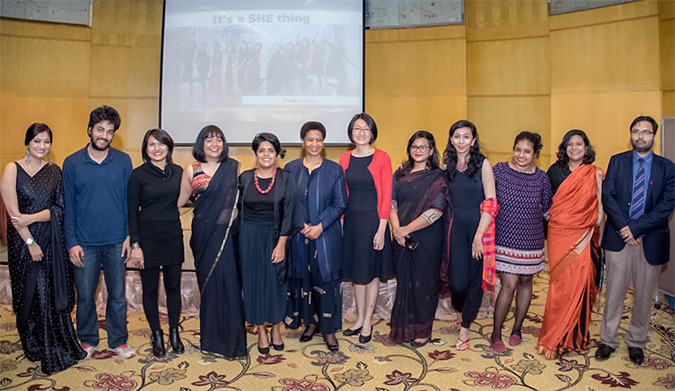
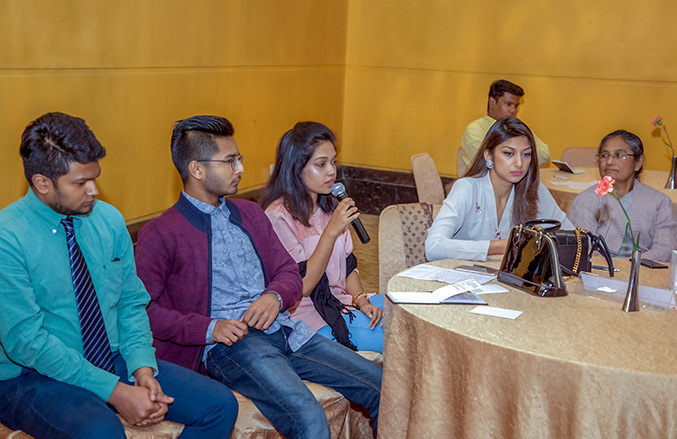
1 February 2018
Today, UN Women Executive Director Phumzile Mlambo-Ngcuka, visited the Rohingya refugee camps in Cox's Bazar, Bangladesh, and met with a number of refugee women and girls. She visited the UN Women Multi-Purpose Women's Centre and the Women-Friendly Space run by Action Aid where UN Women supports women's skills training, and spoke with women and young girls that were at the centres. Both these women-only places provide a safe space for the most vulnerable, neglected and marginalized Rohingya women, especially single mothers and adolescent girls, who have little opportunity to come out of their houses due to the strict gender norms and segregation imposed by cultural and religious practices.
When girls reach puberty, they often miss out on education and recreational activities unless they have access to female-only spaces. The centres are one-stop information hubs for the women to access life-saving information and participate in awareness sessions on health, nutrition, prevention of gender-based violence and others. The centres also offer women referral to services, psycho-social support and peer mentoring support with Rohingya women who arrived in Bangladesh before the crisis that started in August 2017.
Walking around the centres, the Executive Director was shown different rooms for psycho-social counselling, breastfeeding and child care, health consultation and group activities. She also saw the secured bathing space and latrine that can only be accessed by women from inside the centre, which is in contrast to the stand-alone facilities outside of the centre which women avoid using due to lack security and privacy concerns.
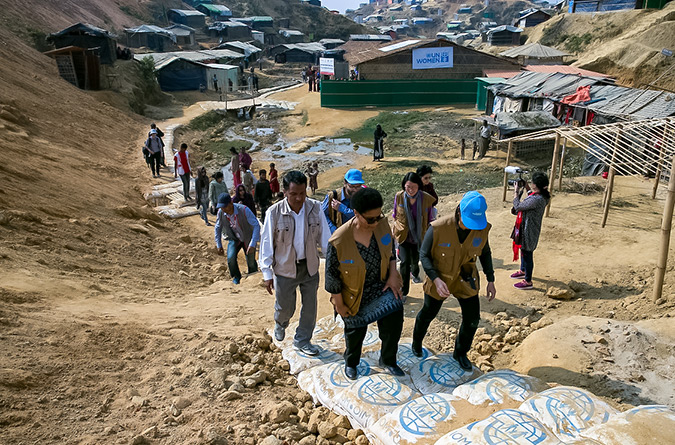
At the centre, Rohingya women shared with the Executive Director the challenges that they face in accessing enough food for their family and getting cash in their hand to buy any additional food items. When asked what she needs the most, one widowed woman told the Executive Director that she needed a burka to be able to step outside of her shelter because she is not always able to borrow one from her neighbour when she needs.
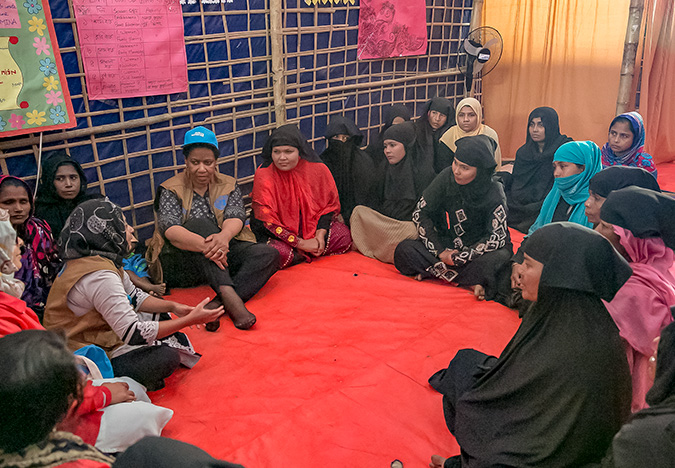
In the "Life-Skills training corner", the Executive Director met young women who have just started learning tailoring. Their teacher Romida, 30, is a Rohingya who used to have a tailoring business in Myanmar before she fled as a refugee to Bangladesh herself three months ago. "I am very happy to contribute to my community," she said. "I am able to teach my students this important skill that they can start their business with." The UN Women-supported centre offers daily tailoring class to 10 adolescent girls and women aged 15-25 years.
"Stay ambitious and use this as a chance to learn," the Executive Director said to young Rohingya women and their children who were gathered at the Multi-purpose Women's Centre. "You can be teachers, designers, doctors and nurses - anything. UN Women is here to support you so that you will get the right skills and that you will have the means to look after yourselves,"
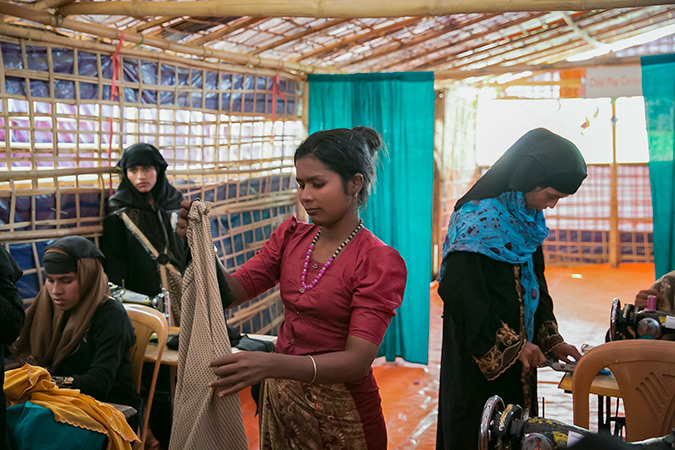
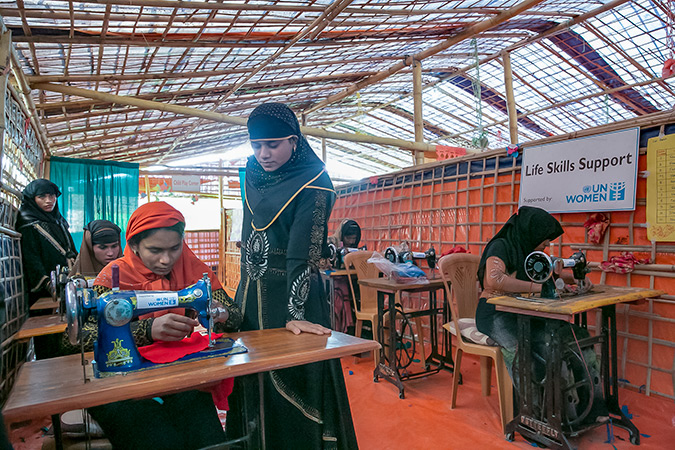
The plan is to also extend the livelihood training to low-income Bangladeshi women and their families from local host communities that have been impacted by the recent influx of refugees. Plans are under way to engage skilled Bangladeshi women from host communities as well as skilled Rohingya women who have stayed longer in the older registered camps, as skill trainers and peer-mentors for the newly arrived Rohingya women in the centres through a cash-for-work programme.
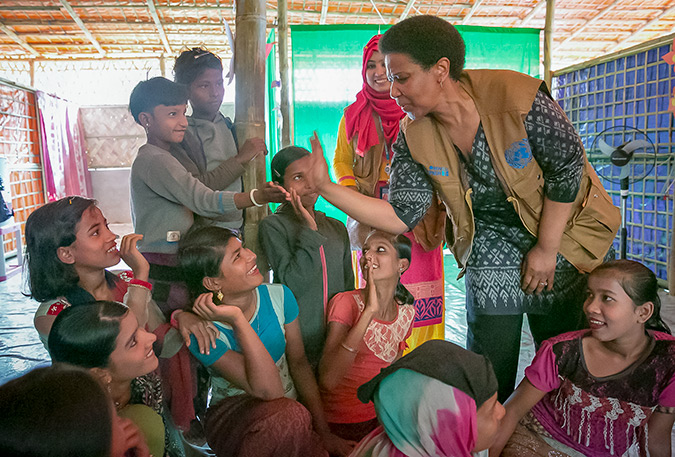
In December 2017, UN Women initiated support to the new refugees in partnership with Action Aid and distributed dignity kits, blankets and alternative fuel made of compressed rice husk briquettes to nearly 8,000 women and their families.
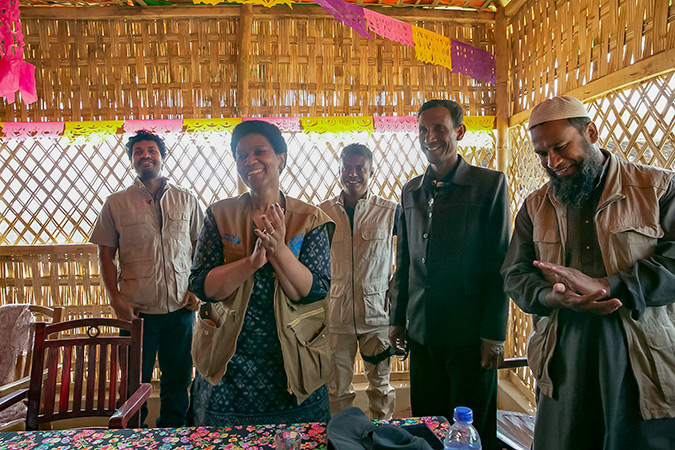
The next stop for the Executive Director was a meeting with the Camp-in-Charge officials (CiCs), deployed by the government to the Rohingya camps. At the moment, there are no women CiCs. After the meeting with the Executive Director in which the CiCs described the nature of their everyday work and challenges, three of the CiCs received a HeForShe award from the Executive Director for their efforts to engage and support women in the camps.
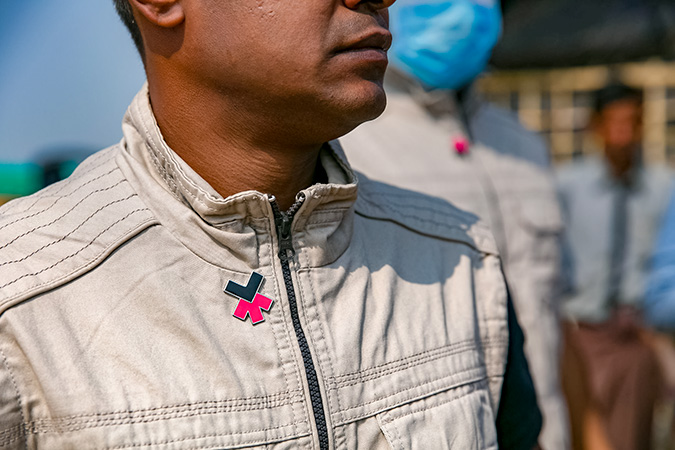
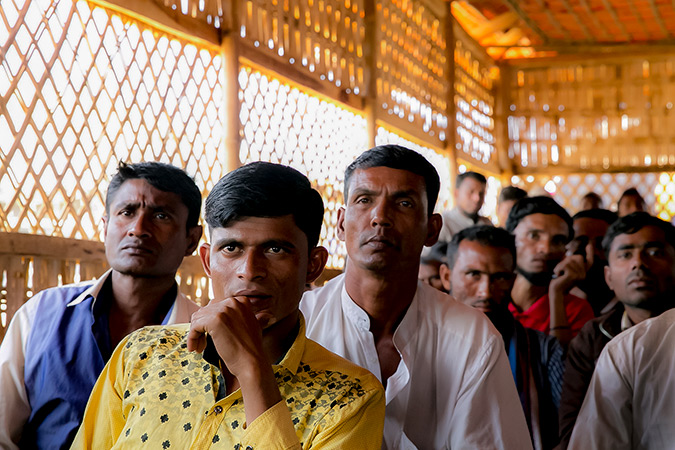
The Executive Director concluded her visit to Bangladesh with a meeting with Prime Minister Sheikh Hasina. The Executive Director thanked the Prime Minister for generously opening the border and sheltering the Rohingya refugees and agreed with the Prime Minister that the host communities impacted by the refugee influx need as much support as the refugees. The Executive Director stressed the need to prepare the refugees for the upcoming monsoon season and relocate the vulnerable households, many of them female-headed, to safer places away from the areas where landslide and flooding are predicted. The Prime Minister and the Executive Director also discussed the numerous gender equality initiatives of the Prime Minister that have significantly improved the lives of women in Bangladesh, including the Prime Minister's latest initiative on women's skills development, notably for women with disabilities. The Executive Director shared that women and disabilities is an area where UN Women is developing a strategy for engagement, and the strategy will be shared with the Government of Bangladesh.
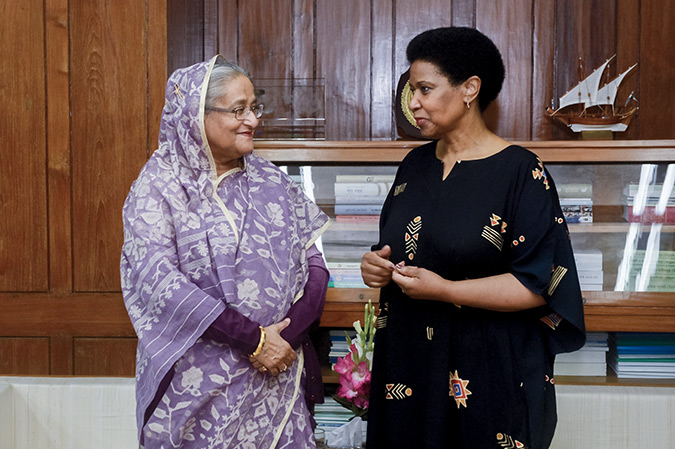
31 January 2018

UN Women Executive Director Phumzile Mlambo-Ngcuka on her second day visited Cox's Bazar, where UN Women together with partners is addressing the world's fastest-growing refugee crisis. More than 688,800 Rohingya refugees have arrived in Bangladesh since August 2017 fleeing persecution in Myanmar, more than half of them women and girls.

The Executive Director's first stop was at the office of the Refugee, Relief and Repatriation (RRRC) Commissioner, Mohammad Abul Kalam. During the meeting, the Commissioner called on UN Women's support to help empower women refugees in the camps by providing them with skills training, and to help facilitate women's participation in camp management. The Executive Director highlighted that the Rohingya refugee crisis has a particularly gendered nature due to the high level and severity of sexual and gender-based violence that the women and girls have faced, and the restrictive socio-cultural norms that women and girls live under. Read more about UN Women's work with Rohingya refugees in Cox's Bazar
The Executive Director applauded the work of the Commissioner's office and urged the Commissioner to enable relocation of vulnerable refugee households, many of them female-headed, from areas at risk of landslides and flooding before the rainy season.
The Executive Director stressed the importance of technology as well as the utmost necessity of an ongoing education for children, especially girls, during her meetings with the women beneficiaries, from the Polli Shomaj who have received financial support from UN Women to start businesses as part of the Prevention of Violent Extremism project, implemented by BRAC. She talked about her experiences in other countries, in which women have helped each other grow their businesses and become more established. She also stressed the importance of learning from rural women and their experiences, in line with the priority theme of UN Commission on the Status of Women (CSW 62). "You will become mentors to others, you will teach others," she said. Members of the Polli Shomaj showcased some of their work to the Executive Director, and discussed how they have utilized the funds to expand their small businesses.

Ms. Mlambo-Ngcuka also met with Davide Rossi, Sector Coordinator for Food Security Sector, World Food Programme, (in Cox's Bazar) who shared a number of concerns that women refugees are facing, including: access to food distribution points because of the gender segregation and lack of mobility of Rohingya women; the importance of access to water points for women, especially for elderly and pregnant women; and the risk of tension between the refugees and the host community over firewood in an area that is already facing resource constraints.
The Executive Director also met with Bernadette Castel, Sector Coordinator, and Bill Fellows, Senior WASH (water, sanitation and hygiene) Advisor from UNICEF. Several priorities to address emerged from meetings with camp officials, humanitarian actors and women refugees themselves. These included: support to improve food, nutrition and sanitation facilities; empowering women to play an active role within the camps; and facilitating income-generating opportunities for women.

Saba Zariv, Sector Coordinator, Gender-based Violence, from UNFPA shared concerns about the safety and dignity of Rohingya women and girls. "Over the last six years, Rohingya have been denied access to healthcare, education," she said. "Yet, they are alive, and happy to have survived." "The key message to the government is that land is a requirement. The situation right now is not sustainable, not even for the host community."
Executive Director Mlambo-Ngcuka stressed the need to prioritize these issues in the humanitarian response.
30 January

UN Women Executive Director Phumzile Mlambo-Ngcuka begins today her first official visit to Bangladesh, witnessing the signing ceremony of a Memorandum of Understanding (MoU) between UN Women and the National Human Rights Commission (NHRC) of Bangladesh. The MoU accentuates the "aligned mutual interest" of the Commission and the strategic priorities of UN Women to end impunity for conflict-related sexual violence, through its work on peace, security and humanitarian action.

The partnership aims to strengthen the capacity of the NHRC to document cases of conflict-related sexual violence in line with international standards and good practice, including the principle of "do no harm". The collaboration also aligns with UN Women's strategic plan for 2018-2021, and the eight resolutions of the Security Council on women, peace and security.
"For Bangladesh's NAP to be effective, civil society actors must continue to play an integral role going forward, sharing their invaluable expertise and vision for a more peaceful and equal society," the Executive Director said. She was speaking at the Closing Session of the Symposium on the Development of a National Action Plan on Women, Peace and Security for Bangladesh in Dhaka, which was attended by senior officials, diplomatic corps, representatives of UN agencies, members of civil society organizations and the media.

"Women must be at the centre of Bangladesh's work to prevent conflict, build peace, and respond to emergencies," Foreign Minister Ali said in his remarks. "Our National Action Plan will demonstrate our continued leadership and commitment" to put into action the principle of enhancing women's participation and meaningful contribution to peace, he told delegates at the closing of the Symposium.

In addition, the Executive Director complimented Bangladesh as a global leader in responding to emergencies. "Your immediate response to the influx of Rohingya demonstrates both compassion and readiness to act," the Executive Director said in her remarks at the closing of the symposium.
Later in the evening, the Executive Director met two women parliamentarians, Former Foreign Minister Dipu Moni and Fazilatun Nasa Bappy, and discussed the significant progress that Bangladesh has achieved in women's political representation, with 20 per cent of female parliamentarians and the adoption of gender-responsive budgeting across 44 ministries.
[Syeda Samara Mortada, Palash Das and Tapati Saha contributed to this article.]